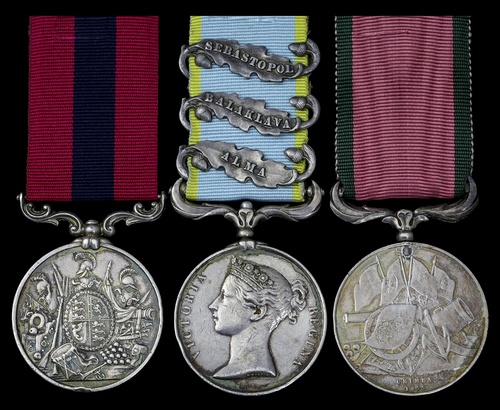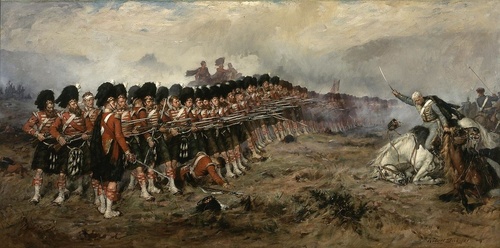Auction: 19001 - Orders, Decorations and Medals
Lot: 536
An exceptional Crimea 'Thin Red Line' D.C.M. group of three awarded awarded to Private D. McTavish, 93rd Highlanders, a veteran of the Upper Canada Rebellion of 1838
Distinguished Conduct Medal, V.R. (Duncan McTavish. 93rd Highlanders); Crimea 1854-56, 3 clasps, Alma, Balaklava, Sebastopol (Pte. Dunn. McTavish. 93rd Ft.), contemporarily engraved naming; Turkish Crimea, British issue, unnamed as issued, plugged and fitted with replacement Crimea suspension, first with heavy edge knock, contact marks, very fine (3)
One of 16 D.C.M.'s awarded to the 93rd Highlanders for the Crimea.
D.C.M. recommendation dated 8 January 1855.
Duncan McTavish was born in 1818 at Inverness, Scotland and was a labourer upon his enlistment on 19 October 1837. He was swiftly posted to join the 93rd Highlanders in Ireland but in early 1838 he tranferrred to Nova Scotia to assist in the ongoing Upper Canada Rebellion.
Upper Canada Rebellion
After the first rebellion of 1837, the majority of rebel leaders fled to the United States. Popular sentiment in the States believed that the Canadians were eager to overthrow British rule and form a republic patterned after the American model, and an organization known as the Hunter Patriots was formed to assist the rebellion. Organized in neo-Masonic secret lodges, and with widespread support in the northern border states from Vermont to Wisconsin, the Patriot Hunters aimed to invade Canada and lead an army of insurgent Canadians against the British colonial government.
McTavish had been initially stationed with his regiment at Halifax, but he was taken ill, spending August-September 1838 in hospital. When his regiment marched to Toronto via Montreal, he was left sick at Montreal on 31st October and was thus attached to the 24th (2nd Warwickshire) Foot at Halifax on his recovery, finally rejoining his regiment at Toronto on 5th June 1839. It would appear McTavish missed his regiments fêted action at the Battle of the Windmill in early November. Beyond his sickness McTavish would surely have played his part when a 'blue-on-blue' occured between the 93rd and a local Volunteer Regiment, as a result of a Sergeant being beaten by a gang of local volunteers. By regimental repute, on the news the entire 93rd Regiment broke loose, mauling and chasing the entire Volunteer battalion out of garrison and through the town. It is safe to assume no Canadian ever insulted the 93rd again.
McTavish returned home to garrison duty at Stirling Castle in late 1848, followed by Edinburgh Castle and other garrison postings.
Crimea - The Thin Red Line
Embarked for Malta in early 1854, the regiment landed on the Crimea via Turkey in September 1854, as part of the Highland Brigade under Sir Colin Campbell.
On 20 September the Brigade in full Highland uniform, with the Guards Brigade, waded across the Alma River. Before the battle Campbell had given them a stirring brief as recounted in The Thin Red Line by Selby:
'He told them to keep shoulder to shoulder, and when in action, whoever was wounded, of whatever rank, must lie where he fell until the bandsmen came up to attend to him. No soldiers were to carry off wounded men. If any soldier did such a thing, he would be in disgrace; his name would be stuck up in his parish church back in Scotland for all to know. Finally he added:
"Don't be in a hurry about firing. Your officers will tell you when it is time to open fire. Be steady. Keep silence. Fire low. Now men, the army is watching us; make me proud of the Highland Brigade!"'
Advancing in echelon, the British took the heights above while under a constant heavy fire. The 93rd was engaged in the coming next months alternating at Sebastopol and on garrison duty. On that famous day, 25 October, they were positioned to protect Balaklava. Several thousand Russian cavalry swept down and captured artillery batteries overlooking a small valley. They rode on with about five thousand continuing on the road to Balaklava, the others diverting to be cut down by the charge of the Heavy Brigade. The 93rd - numbering about 500 including a few walking-wounded - stood firm beyond a ridge in the road to avoid the artillery now turned against them. As the Russian cavalry came nearer the 93rd moved forward and stood in line astride the road to the port and the British supplies. On either flank stood a battalion of their Turkish allies who fired an ineffectual volley at 800 yards, who traditionally, broke and ran.
Sir Colin Campbell rode down the line stating:
"There is no retreat from here men, you must die where you stand."
The 93rd responded:
"Aye Sir Colin, and needs be we'll do that."
Campbell did not form the regiment into a square for he entrusted the gallant Highlanders to hold firm.
Convention dictated that the line should be four deep. However, Campbell, a veteran of 41 years military service, had such a low opinion of the Russian cavalry that he did not form four lines, but met the charge head on with the 2-deep firing line. As the Russian cavalry approached, the 93rd discharged three volleys: at 600, 350 and 150 yards respectively. They commenced fire by files. The cavalry split in half and veered to the left and right wheeling back. The Grenadier Company wheeled right to fire once more into the horsemen to refuse the flank and to ensure the enemy's retreat.
On a hill above, London Times correspondent W. H. Russell watched and wrote of '...nothing standing between the cavalry and the supply base but the thin red streak tipped with steel.' The report gained the Regiment immortality and gave them their nickname - they were 'The Thin Red Line.'
McTavish was sent to hospital at Scutari on 12 August 1855, returned to England on 21 August 1855 and was sufficiently recovered to be stationed at Dundee in October 1855. He would receive his D.C.M. together with a gratuity of £5 on its issuance on 18 May 1856, rejoining the regiment at Dover in June 1857. He was discharged to pension in March 1859; sold with copied service record and research.
Subject to 20% VAT on Buyer’s Premium. For more information please view Terms and Conditions for Buyers.
Sold for
£4,200







